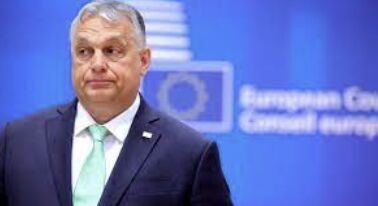Hungary Snags €900 Million EU Funding Despite Prime Minister's Attempts to Undermine Ukraine's EU Ambitions
The European Union has announced that Hungary will receive 900 million euros in funding to help recover from the energy crisis caused by Russia's invasion of Ukraine, despite the Hungarian Prime Minister's anti-EU actions. However, the funds are contingent on the completion of rule of law reforms. Poland has also received approval for funds after pro-EU parties secured an election victory.
Hungary is set to receive a significant amount of funding from the European Union (EU) despite the Hungarian Prime Minister's efforts to undermine the EU's support for Ukraine. The EU's executive arm announced that Hungary will receive 900 million euros ($981 million) from the bloc's REPowerEU program, which aims to help EU nations recover from the energy crisis that followed Russia's invasion of Ukraine and reduce their dependence on Russian fossil fuels. This decision comes at a crucial time as Hungarian Prime Minister, Viktor Orban, threatens to derail Ukraine's ambition to join the EU and block the disbursement of a planned 50 billion euros ($54.5 billion) in aid to Kyiv.
EU leaders are scheduled to meet in Brussels next month to discuss Ukraine's future accession, making this funding allocation even more significant. The total value of Hungary's post-pandemic recovery plan, including the REPowerEU chapter, amounts to 10.4 billion euros ($11.3 billion) in loans and grants. However, the European Commission emphasized that Hungary must achieve rule of law reforms before the bulk of this funding can be released. The Commission will only authorize regular disbursements based on the satisfactory completion of these reforms, which aim to protect the Union's financial interests and strengthen judicial independence.
Hungary, being a major recipient of EU funds, has faced mounting criticism for straying from democratic norms. The European Commission has accused Orban's government of dismantling democratic institutions, controlling the media, and infringing on minority rights for nearly a decade. Orban, who has been in office since 2010, denies these allegations. Furthermore, Orban has repeatedly angered the EU with his stance on Russia's conflict in Ukraine. He has criticized the effectiveness and counter-productivity of the sanctions imposed by member countries against Russia.
Last month, he even met with Russian President Vladimir Putin in a rare in-person meeting between the leader of a European Union country and Putin. In response to Hungary's failure to implement rule-of-law reforms, the EU froze billions of euros in cohesion funds allocated to the country last December. Although Hungary denies linking EU funds to other issues, many in Brussels perceive Orban's veto threats regarding aid to Ukraine as an attempt to blackmail the bloc into releasing regular EU funds and pandemic recovery cash that has been withheld.
On a positive note, the European Commission recently approved Poland's revised recovery plan, which paved the way for the payment of 5.1 billion euros ($5.56 billion) to Warsaw. This announcement comes after Poland's parliamentary majority secured an election victory for pro-EU parties aligned with Donald Tusk, who is expected to become the country's next prime minister. Tusk has been working to repair Poland's strained ties with the EU and unlock frozen funds due to democratic backsliding under the outgoing nationalist government.




